june-top.html
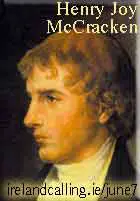 1798 The Battle of Antrim took place on this day in 1798. It was one of many conflicts of the Irish Rebellion between the United Irishmen and the British army. The rebel leader, Henry Joy McCracken initially started with around 10,000 men, but infighting and a lack of arms led to more than half deserting. The remainder pressed on towards the town of Antrim.
1798 The Battle of Antrim took place on this day in 1798. It was one of many conflicts of the Irish Rebellion between the United Irishmen and the British army. The rebel leader, Henry Joy McCracken initially started with around 10,000 men, but infighting and a lack of arms led to more than half deserting. The remainder pressed on towards the town of Antrim.
The town was defended by 200 British soldiers, although they were far better equipped than the rebels and had sent for reinforcements. They set up their defence at the base of Antrim Castle and set light to any buildings they suspected of being potential rebel safe houses.
The rebels reached the town in the early afternoon but were forced to retreat by gunshots from the British. With visibility extremely poor due to the dust and smoke in the air, the British mistakenly thought the rebels had completely fled and moved forward to capture any remaining. This was a major error as the 200 British moved forward into a gauntlet of pike-wielding and musket-firing rebels.
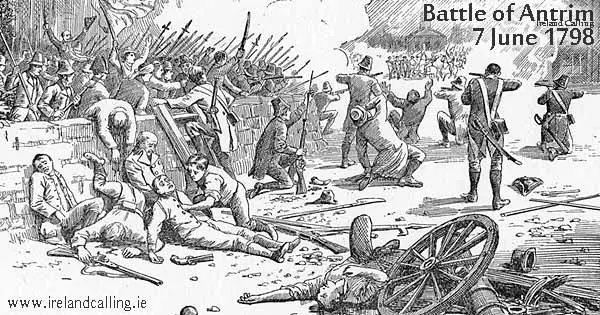
The rebels moved forward to take the town and what was left of the British troops were forced back to the castle wall. The rebels were on the verge of taking complete control when British reinforcements arrived from Belfast. Upon seeing the carnage at the main gates, they assumed the rebels had taken the town and began to shell it with heavy artillery.
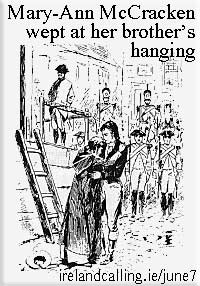
The rebels were now facing an enemy they couldn’t see, and without the arms to match the British attack, they were forced to flee the town.
A small group of rebels, led by James Hope, returned fire and kept the attention of the British long enough for the majority of the rebels to escape.
Hope and his men eventually ran out of ammunition and also fled the town. The British moved in and looted and burnt several buildings, and slaughtered any suspected rebels.
McCracken was later caught and arrested. He was offered his freedom in return for the names of other major leaders of the United Irishmen, but refused and was hanged in Belfast, a little over a week after being elected as the Ulster United Irishmen’s leader.
See our BITESIZE articles on the history of the 1798 Rebellion
Click here to read more about Irish history
* * *
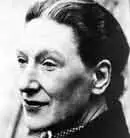 1899 Elizabeth Bowen was born in Dublin on this day in 1899. She moved to England at a young age to be raised by her aunts after losing both her parents. She developed a flair for writing. She later married although it was allegedly never consummated. In fact, Bowen’s marriage was described as “a sexless but contented union”, and she had a string of affairs.
1899 Elizabeth Bowen was born in Dublin on this day in 1899. She moved to England at a young age to be raised by her aunts after losing both her parents. She developed a flair for writing. She later married although it was allegedly never consummated. In fact, Bowen’s marriage was described as “a sexless but contented union”, and she had a string of affairs.
Bowen inherited Bowen’s Court in County Cork and used it as a holiday home. She had several books published, with her most notable works being The Last September, The Death of the Heart and Eva Trout. Despite this, Bowen struggled financially and eventually had to sell her beloved Bowen’s Court. She died of lung cancer in 1973 in London.
Click here to read about more Irish writers
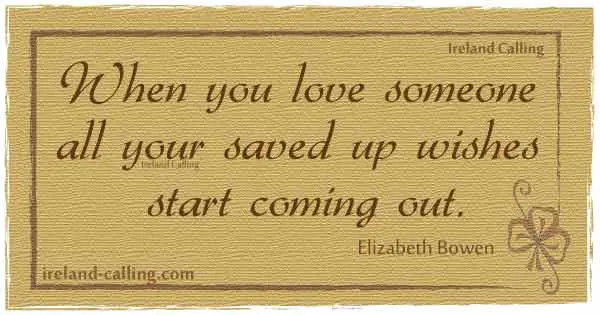
Her 1929 novel, The Last September, was made into a film starring Maggie Smith, Michael Gambon, Fiona Shaw and David Tennant. See it all here.
* * *
1952 Happy birthday to Liam Neeson, born in County Antrim on this day in 1956. He is one of the most in-demand actors in Hollywood since his performance in the Oscar-winning Schindler’s List in 1993. Neeson has also played historical Irish figure Michael Collins, as well as starring in several other blockbuster movies.
Click here to read more about Liam Neeson
Click here to read about more Irish actors
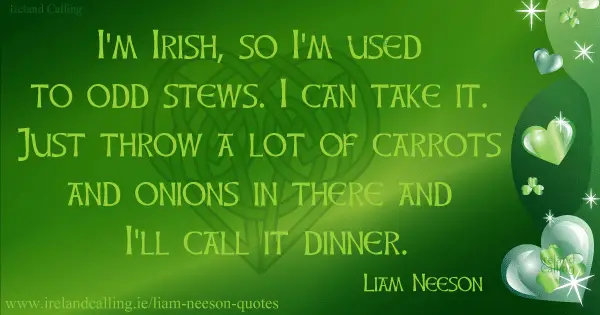
* * *
1956 Happy birthday to Marty Whelan, born in Dublin on this day in 1956. He is one of the most recognisable faces on Irish television, having being a presenter of several shows in the 1990s and 2000s.
Whelan hosted the Rose of Tralee contest up until 2003, and has also presented game shows Millionaire and Fame and Fortune. He has also done the RTÉ coverage for the Eurovision Song Contest. Whelan remains one of Ireland’s most loved entertainers.
Click here for some of the best Irish humour
* * *
1999 On this day in 1999, Michelle de Bruin effectively had her swimming career ended when her four-year ban was upheld by the Court of Arbitration for Sport. The Olympic triple gold winner from Dublin was banned by the official governing body FINA, for testing positive for a performance enhancing drug in 1998.
De Bruin was not stripped of her Olympic medals, as the doping offence took place during a separate period. To this day she denies knowingly taking anything illegal in the sport. As a result of the ban, which ended her hopes of competing competitively again, she began studying law.
Whether or not de Bruin intentionally took anything only she will ever know. A shameful act of greed to bring shame on her sport and her country? Or a terrible injustice with the world’s best being cut short in her prime? Either way it was a tragic end to the career of one of Ireland’s greatest ever Olympians.
Click here to read about more top Irish sports stars
* * *
2004 Mary Holland died aged 68 on this day in 2004. She was a journalist and began her career in fashion before becoming the Irish Times chief journalist on issues in Northern Ireland. Holland was one of the first British writers to report on the Northern Ireland and the political and social divide in the country.
She covered numerous conflicts during the ‘Troubles’ in the 1970s and 80s. She won several awards throughout her career for her work, including the Prix Italia award for her television documentary on the Creggan in Derry, which was a housing estate built specifically to house the Catholic community in the area.
Click here to read about more Irish writers
june-bottom.html